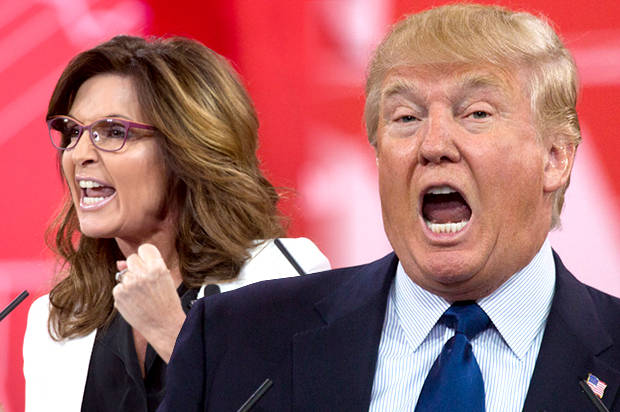 Self-Terrorization, The National Pastime
Self-Terrorization, The National Pastime
Self-Terrorization, The National Pastime
Our terrified hyperpatriots: Here’s what Palin, Trump and anti-Muslim extremists fear most
When Palin demands "speak American" or Trump targets Muslims, this is the fear they're playing on
In times of racism, there is no such thing as a neutral articulation of culture. In fact, the practice of everyday culture becomes inherently threatening. The victim of racism cannot partake of even simple rites of identity without the racist interpreting those rites as proof of the victim’s inferiority.
This phenomenon has played out in the United States for centuries around forms of black and Native music, phenotype, dialect, fashion, language and spirituality. We now see it in paranoid and sometimes violent reaction to anything that signals Arab-ness, which itself, against the realities Arabs actually inhabit, signals a singular and immutable Islam.
A man in Philadelphia was recently beaten for speaking Arabic. A few months earlier, two Palestinians were prevented from boarding a flight at Chicago’s Midway Airport because another passenger heard the same terrifying sounds. After raising a fuss, the men were finally allowed on the plane. A skittish flier demanded to know what was in a box they carried, so the two men popped open the baklawa and a planeload of people (minus two, presumably) entered the sky full and happy.
On Martin Luther King Day, Delta removed “a random brown person” from a flight after a customer expressed apprehension. After his removal, surely a moment of terrible humiliation for him, a flight attendant thanked the passenger who had complained—an ideological act, no doubt, but one also intended to assuage potential guilt or discomfort. These gestures normalize the hierarchies that allow only the majority to access safety and dignity.
Arabs, and those who might be mistaken for one (however implausibly), have less to worry about from the Transportation Security Administration than they do from fellow travelers eager to fulfill their patriotic obligations.
People have been kicked off airplanes for speaking Arabic, holding the Quran, wearing strange regalia, reading Amin Maalouf’s “The Crusades Through Arab Eyes,” or simply being brown. This discrimination is troublesome on its own, but consider: Which hijacker in the history of air travel announced his ill intentions by flaunting the same imagery everyone around him is conditioned to fear? American racism has always rendered itself indispensable by transforming the mundane into something spectacular or sinister.
The cultural artifacts of Arab-ness (themselves media inventions) would be inconsequential, at worst an exotic curiosity, if they didn’t illuminate the distressing fact that some people are incapable of becoming real Americans.
Why else do hyperpatriots regularly harass or assault women wearing hijab? They detest such dangerous symbols. The perception of danger is a byproduct of the hyperpatriot’s underactive imagination, which makes him even more apt to act on his angst. The hijab is the most brazen of the garments that trigger a vision of the future in which imperiled white Christians are subject to the barbarism of a new majority. The hyperpatriot isn’t threatened by theocracy, per se, for his own political idols implement theocratic laws in the United States. It is the prospect of a theocracy in which he isn’t cosseted as exceptional that so enrages him.
There is also the spectacle of confusing Sikhs with Muslims and in turn attacking them, a uniquely American phenomenon. In 2012, white supremacist Wade Michael Page, thinking they were Muslim, murdered six people at a Sikh temple in Oak Creek, Wisconsin, one of the gravest examples of modern American terrorism. Despite endless discussion of terrorism in the United States, Page is virtually forgotten. The same media that hesitated to call him a terrorist reinforce the notions of an undifferentiated foreign threat that informed Page’s confusion.
No comments:
Post a Comment